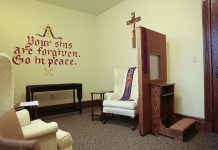
by Kate Ristow
Catechetical leaders whose sacramental preparation programs get rave evaluations each year often attribute this accomplishment to their concerted efforts to energize and engage parents in every possible way. The strategies below work. Choose one or more to implement in your parish. Make them your own by adapting them to meet your needs.
Parent Meetings
Bringing parents together to kick off the immediate preparation phase of a given sacrament—Eucharist, reconciliation, or confirmation—is a time-honored tradition. But it’s what you do when you have the parents gathered that counts. Here are some ways to energize and engage parents and get them more involved with the parish.
If you are thinking about booking a speaker for your parents meeting, think first about what you want the speaker to address. Too often, we ask speakers to explore something like the theology of the Eucharist, a topic that would probably be of more interest to professional religious educators than a group of young parents faced with the responsibility of preparing a child for first Communion.
Invite speakers to outline three to five things we want parents to know about the Eucharist. For example, first and foremost, parents need to know that the Eucharist is the real presence of Jesus’ body and blood, soul and divinity. After the priest says the words of consecration at Mass, what looks, smells, and feels like bread and wine, is in fact now the body and blood of Christ. This is a central belief of Catholicism—and a great mystery of our faith.
Ask the speaker to specifically offer suggestions for talking to kids about this. This is a truth of our faith that must be explored, discussed and pondered again and again as we grow in faith.
Insist that your speaker be brief. Studies clearly show that attention span drops dramatically after 20 minutes. It’s better to leave an audience hungry for more information than to overload them with input. After a break, you might build in a Q-and-A period featuring the speaker, your pastor, and you or offer books, DVDs, and other take home or for-purchase enrichment resources for parents looking for more doctrine or tips for working with their kids.
Consider having parents and their children come together for a kickoff meeting or enrichment meetings throughout the year. You might even drop one or two of the children’s class sessions in lieu of parent/child gatherings. This puts the focus right where it belongs: on the family.
Let the Kids’ Lights Shine
Plan parent/child sessions that give kids the opportunity to participate. For example, children preparing for first reconciliation can perform several short Gospel story plays, such as the forgiving father, the good Samaritan, the good shepherd to name a few, at a parent/child meeting or at separate meetings held throughout the preparation process. The speaker or the catechetical leader can discuss the story to illustrate what it teaches us about God’s forgiveness or penance. Scripture plays for first Eucharist might include the Feeding of the Five Thousand, the Last Supper, the parable of the sower, and so forth.
This approach enables the children to learn by doing and to show their parents what they have learned. It encourages parents to listen and watch closely as they explore the meaning of a Scripture passage related to their child’s preparation for the reception of a sacrament.
As an alternative to performing a Gospel play, you might provide an opportunity for the children to sing one of the songs they will sing on their special day. While you are conducting a brief parent meeting, the children can be nearby working on a lesson in their sacrament books and practicing their song. Conclude the meeting by bringing both groups together for prayer and having the children sing or act out the play they have prepared. This is a positive and memorable experience for the kids and their parents and gives new life to listening to a lecture about theology!
A Family Retreat Day
In the weeks leading up to the reception of the sacrament, provide a two to three-hour “retreat” experience for the kids and one or both of their parents. Let parents know that while both parents are invited, they are encouraged to participate even if only one parent can attend. This tells parents that you understand the realities of busy families today.
At the first Communion retreat, you might set up stations for the kids and parents to visit: they can do an activity that helps them review Mass responses at one station, watch a short age-appropriate DVD at another, review the story of the Last Supper at a third, write the general intercessions you’ll use the day of the celebration at another, and visit a station to make individual pew banners or decorate a large white sheet that will be used as a banner at first Communion. Simply draw a large 8” circle for each child to decorate with fabric markers. Working together on a project makes the child feel special and heightens their excitement to receive the Eucharist. It enables parents to spend one-on-one time with their child and talk about their own first Communion or what they hope for their child. The possibilities are endless! You can do similar activities at a first reconciliation retreat—meet with your catechists to brainstorm a list of stations you can create to help parents and their kids prepare for celebrating penance.
Second-Tier
Parent Meetings
Don’t ignore the fact that parents with more than one child have participated in previous sacrament prep meetings for their older children. While it won’t hurt them to listen to a new speaker, they may be more receptive to a different approach. Gather the second and third-timers together. Ask an experienced catechist to facilitate a group discussion among these “veteran” parents. Focus on how they want to make the preparation process special for the child they are now preparing or how their own faith has grown as they’ve prepared their children for a sacrament.
Another option is to ask one or two of the “second tier” couples to work together to give a PowerPoint presentation focused on tips for preparing a child for first Eucharist (or reconciliation or the sacrament of confirmation). Parents always benefit when they have the opportunity to learn from peers.
First Communion Committee
There are lots of decisions to be made surrounding any sacrament program—even if your approach varies little from year to year. Think about the first Communion celebration for a moment: How will the church be decorated on that special day? Will there be a procession? Will the kids sit in individual pews, with their families, or as a group at the front of the church during Mass? Are parents interested in booking a professional photographer for photos? Is a group photograph something parents want? What readings will be proclaimed? What hymns will the children sing? The list goes on.
Organizing a parent committee and inviting a catechist or two to join the panel enables more people to have a voice in planning and celebrating a sacrament. The committee can also share in the work that needs to be done—from lining the kids up for a procession, helping lectors practice their readings, making name tags, deciding on the seating chart, arranging and serving refreshments at a meeting—there is always work to be done!
Don’t handpick a committee of your choice. Instead, put a sign-up sheet out at your first gathering or on a clipboard outside your office. Set a reasonable maximum number of members—eight to 12 people can work well together without anyone feeling redundant. Allowing a random sign-up of committee members rather than choosing parents you know personally ensures that you’ll get a wide variety of suggestions and better representation of the parents in general.
One Size Does Not Fit All
Successful DREs recognize that some families have special circumstances that need to be addressed. Perhaps both mom and dad do shift work and are unable to attend the evening meetings you’ve planned. Another family does not want to participate in a group Communion Mass—they’d prefer to celebrate at the regular Sunday Mass they attend each week. Yet another family has a close friend or relative who is a priest. They wonder if he could concelebrate the first Communion Mass and give their child the Eucharist for the first time. Or another family wants to know if their child’s celebration can take place in the chapel at the assisted-living facility where a great grandparent resides.
What is the danger of considering how you can honor special requests like these? Many catechetical leaders worry that any variation in policy will create a slippery slope that everyone will want to take advantage of. But, wouldn’t it be wonderful if we could truly serve all the families in our programs? To be sure, it might involve more work—you’d need to consult with your pastor and, in some cases, the Communion committee, but if at all possible, wouldn’t it be great if sacrament programs were more about people’s needs than policies? A DRE I know who believes flexibility is an important hallmark of any sacramental prep program once allowed a second grader to receive her first Communion at the regular 10:00 a.m. Mass on Sunday. The reason? The child’s father sang in the choir and since that Mass was such an important part of their family’s experience, it seemed like the perfect time and place for the child to receive the Eucharist. Over the years, that Mass has evolved into a “small group” first Communion option for families looking for a more low-key event. This change did not result in more work for the DRE—members of the first Communion committee take turns hosting the Masses: greeting families, making sure they have a pew near the front, and providing the lector with a pre-written petition for the child and his or her family that is prayed during the general intercessions.
Making Name Tags
Provide construction paper or tagboard, scissors, markers, self-stick tape, glue, cotton balls, sequins, and other supplies that can be used to adorn the name tags. When the tags are decorated, have families talk about the significance of the shape and how it relates to the sacrament for which they are preparing. During a first reconciliation, use the sheep name tags and tell the story of the good shepherd (John 10:1-6). At a first Eucharist meeting, use the chalice name tag and tell the story of the Last Supper (Matthew 26:26-28) during your gathering.
Kate Ristow, contributing editor to Catechist, has worked in Catholic publishing for more than 30 years as a national speaker and writer, building on a wealth of experience in the religious formation of children and catechists in both parish and Catholic school programs.
Image credit: Sukan Photo / Shutter Stock 498964327
Copyright 2016, Bayard, Inc. All rights reserved. This article is protected by United States copyright and other intellectual property laws and may not be reproduced, rewritten, distributed, redisseminated, transmitted, displayed, published or broadcast, directly or indirectly, in any medium without the prior written permission of Bayard, Inc.
This article was written by the Catechist Staff and appeared in Catechist magazine, April 2016.
Image Credit: Aris Suwanmalee/Shutter Stock 555003484




